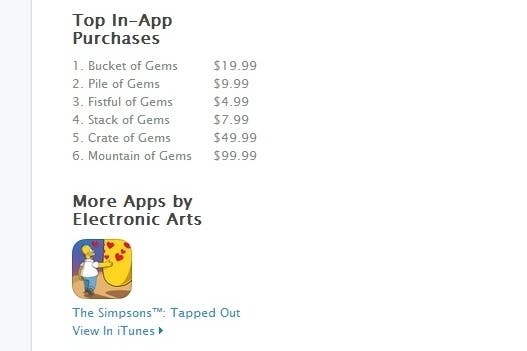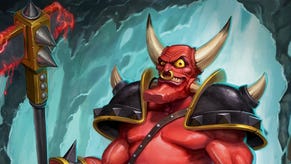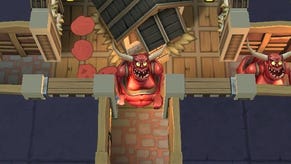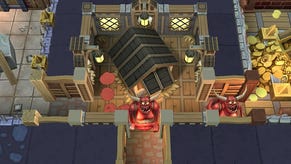Console developers need to look at Dungeon Keeper and learn
Mobile gaming is a joke. Don't become the next punch-line.
"We don't have a mobile gaming industry anymore. We have a mobile scamming industry."
So said Thomas Baekdal in a column last week, swinging for the head of a nail with a strike so true that I found myself letting out an involuntary splutter of agreement.
It wasn't so long ago that mobile gaming - and by extension tablet gaming - was the great white hope. Amidst the stagnation of traditional console and computer games, mobile was a hotbed of imagination and innovation where none of the usual rules applied. As the big old studios and publishers disintegrated, mobile allowed the smartest survivors to land on their feet and make the kind of games they and we really cared about.
Nowadays it's a very different picture. There are a few people still doing good work on mobile (Simogo and the guy behind Blek are the first two that spring to mind), but the majority of smart indie developers have moved on to Steam or been signed up by Sony. They leave the mobile app stores to a new breed of business optimisers engaged in what increasingly feels like a pitiable race to the bottom. A few of these people are making a lot of money, but at what cost?
The latest example of their output is Dungeon Keeper, which joins Electronic Arts' burgeoning shop of horrors. EA draws more attention than most when it tries this stuff because it uses cherished properties like Ultima to do so, and it should know better, but in many respects it's no worse than the likes of King and Zynga, who exist primarily to behave this way rather than just dabbling in it.

Whenever you write about this phenomenon, the common complaint from people making the games in question is that not all of them are bad. As Thomas Baekdal realised though, the problem is definition. When your free-to-play game is all economy mechanics rather than game mechanics, when your game is all business design rather than game design, you're not actually making a game - you're constructing a scam, whether you realise it or not. If you're doing it knowingly, you're just a high-tech gangster.
"It's extremely important that we continue to draw a big, unmissable line between the people running rackets and the people doing good work."
So I agree: it's extremely important that we continue to draw a big, unmissable line between the people running rackets and the people doing good work. If we don't, the potential for long-term damage is huge. We've just about gotten to the point that legislators who grew up playing games can react sensibly to them in public life, for example. What about the generation that follows them, currently growing up playing stuff like Dungeon Keeper? They will arrive in office thinking games are made by the mob.
This is timely because another group of people who will be thinking about it at the moment are console game developers. Faced with rising costs and haunted by the recent memory of so much turmoil at the end of the last generation, they are looking to business success in the free-to-play sector for inspiration to safeguard their futures.
Inevitably, we're seeing a lot of missteps as they play catch-up. Games like Forza Motorsport 5 have come under fire for misjudgements that have called into question their creative integrity, reconfiguring themselves to slow players down unless they grind away at the same challenges repeatedly or invest additional real-world money. We have to hope that the games' developers, chastened by the response, take the right lessons from their experience. I think they probably will, because the majority have their hearts in the right place, although we will do our best to point out when they do not.

If console developers are looking for inspiration, though, the good news is that it's easy to identify existing games on the right side of the line. Usually on PC, their unifying quality is that they are made with creative intent and respect for their potential audience. Their developers face the same balancing challenges as anyone else, but they regard their game as optimised when you enjoy and admire their work. If they then discover your enjoyment and admiration isn't enough to sustain them, they try another tack, rather than turning up on your PC desktop with a plank of wood and a sledgehammer.
When they get the balance right, though, the rewards are far greater than they are for the conmen sloshing around mobile development with their "coercive monetisation" manuals. The decision to buy expert packs in Hearthstone, for example, only comes after a dozen or more hours learning its fascinating intricacies, at which point you hand over your money as much because you believe it's been earned as because you want what you're buying. As a game developer, who has probably grown up loving games and got into this line of work to experience the other side of that rich relationship, isn't that what you would want?
The difference between that and spending money to cut down the time an imp takes to dig through a block in Dungeon Keeper should be self-evident, but under the circumstances it's worth spelling out: it means that the small team working on the game at Blizzard find their work creatively fulfilling, while the community of players that has congregated around that work love and respect it. That bond may last a lifetime.
The proliferation of games like Dungeon Keeper suggests it's too late for a lot of mobile developers, but the good work being done on PC points to another possible future. If I were busy building free-to-play ideas into a PlayStation 4 or Xbox One game, I know which side of the line I'd prefer to end up on. Reject the ways of the scammers. Be a game developer.









